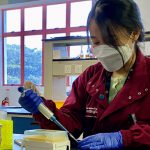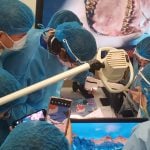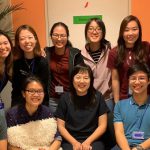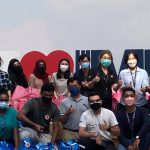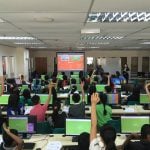Five third year IMU pharmacy students, Karmelia Chan, Wong Jin-Ying, Lee Ming Zhao, Kok Yu Qian and Sellam Elangovan had the opportunity to undergo a pharmacy internship at Pantai Hospital Kuala Lumpur (PHKL) as part of their elective module in Semester 6. During this internship, they were rotated individually to several departments including Outpatient and Inpatient Pharmacy, Clinical, Total Parenteral Nutrition (TPN), Cytotoxic Drug Reconstitution (CDR) and Main Store. Karmelia, Jin-Ying and Ming Zhao relate their experience here. “At PHKL, there are several outpatient pharmacies catering to the variety of specialties there. We were exposed to the process of receiving prescriptions from the specialist clinics. From there, we assisted in prescription screening followed by packing of medications. In a way, we are able to familiarise ourselves with brand names of medications. At that time, we had a glimpse of the implementation of e-prescriptions as part of an initiative to integrate IT into our healthcare system. Inpatient pharmacy, on the other hand, caters to patients in the wards, emergency departments and also critical care units. The activities we conducted in inpatient pharmacy were similar to outpatient pharmacy except we were able to apply our laboratory skills in preparing galenicals extemporaneously as ward stock.
The highlight of our clinical rotation is being part of the ward rounds with other healthcare professionals that is under Dato’ Dr Rajbans Singh, who is a geriatrics specialist. We observed nurses, dietitians and even a physiotherapist have patient-centered discussions in a multidisciplinary approach in the hopes of giving the best possible treatment to patients.
We shadowed pharmacists in daily case clerking and medication reviews to optimise patient care. In addition to bedside counseling, we observed staff training by pharmacists on new medical devices, which portrays interprofessional learning (IPL) at the hospital. We were also given the chance to observe the role of TPN pharmacists. The TPN pharmacist taught us about the indications for TPN, required calculations, and the suitable regimens available in the hospital by allowing us to have access to the patient’s case notes. This allowed us to understand the full clinical picture and how to modify and optimise the patient’s treatment plan based on patient’s progress. Our attachment in CDR exposed us to the various responsibilities of a CDR pharmacist such as in handling cytotoxic drugs, counselling patients on their oral chemotherapy regimen, and maintaining the clean room. We observed that counselling of oral chemotherapy emphasises on the side effects of the drug in contrast to other oral medications especially to patients taking it for the first time. This experience has increased our awareness on practicing good aseptic techniques, protective gowning procedures and principles of clean room design that we have focused on in our pharmacy degree syllabus. 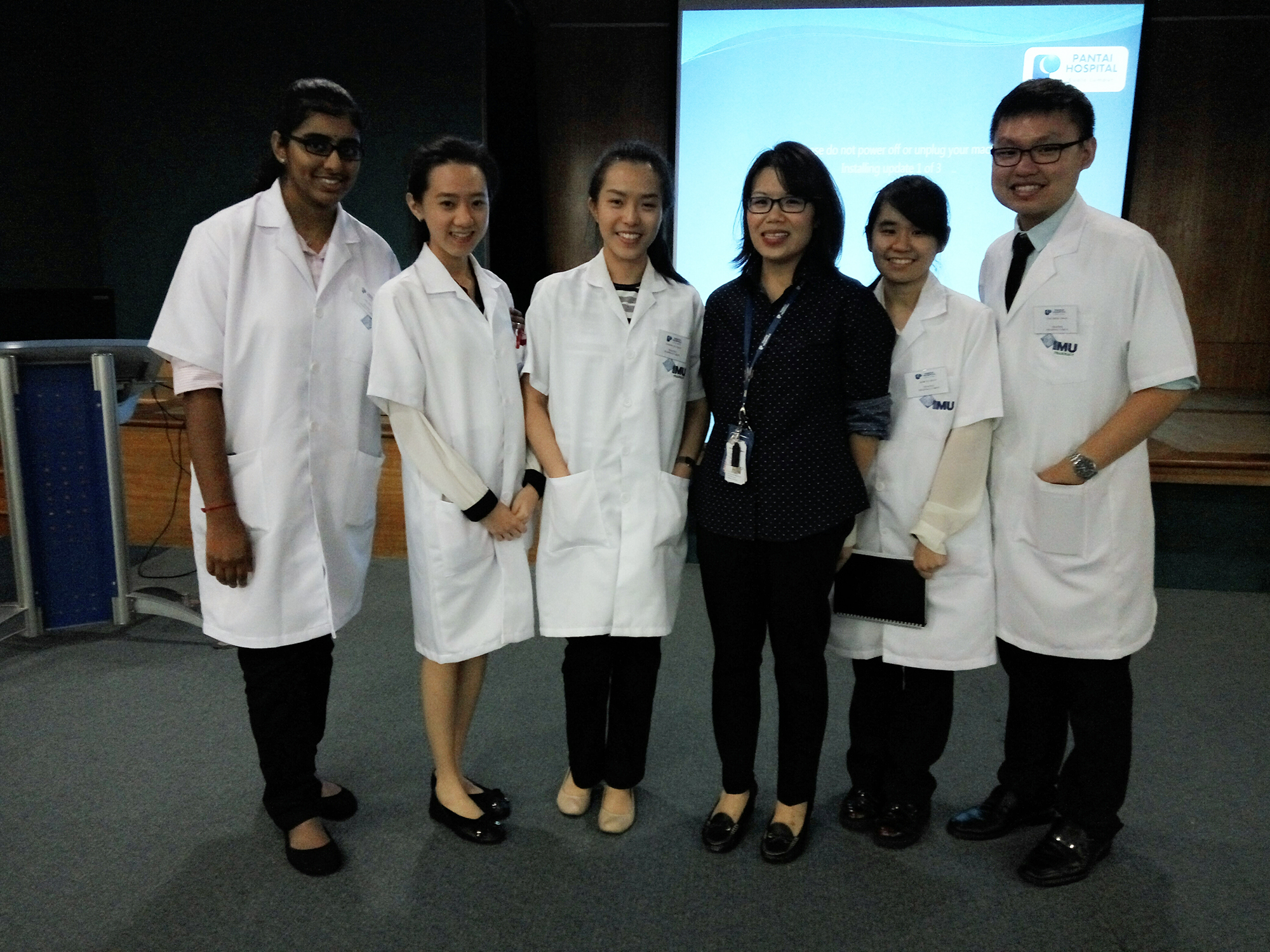 Not only that, our rotation to the main store of PHKL provided us with basic knowledge and overview of the organisation structure of the Pharmacy Department in terms of stock procurement, distribution, and control. We observed the importance of understanding stock movement, drug usage patterns, maintaining maximum and minimum stock levels, and monitoring the expiry date to keep up with the hospital’s demand. We were also briefed on the application of Good Storage Practice (GSP) in maintaining cleanliness, sanitation, and security of the store. In addition, we were also fortunate enough to attend several talks that were conducted by pharmaceutical companies in conjunction with the Continuous Professional Development (CPD) scheme for all pharmacists. The talks enable the pharmacy staff of PHKL to keep abreast about new pharmaceutical products and treatment approaches.
Not only that, our rotation to the main store of PHKL provided us with basic knowledge and overview of the organisation structure of the Pharmacy Department in terms of stock procurement, distribution, and control. We observed the importance of understanding stock movement, drug usage patterns, maintaining maximum and minimum stock levels, and monitoring the expiry date to keep up with the hospital’s demand. We were also briefed on the application of Good Storage Practice (GSP) in maintaining cleanliness, sanitation, and security of the store. In addition, we were also fortunate enough to attend several talks that were conducted by pharmaceutical companies in conjunction with the Continuous Professional Development (CPD) scheme for all pharmacists. The talks enable the pharmacy staff of PHKL to keep abreast about new pharmaceutical products and treatment approaches.
We also had the opportunity to attend an antimicrobial stewardship talk by the clinical pharmacist during Hand Hygiene Week. It was an eye-opening experience because we learnt not only about a pharmacist’s role in preventing antibiotic resistance, but also from the point of view of a pathologist through proper blood sampling techniques. This goes to show that IPL enhances patient safety through team dynamics and communication.
| “This 6-week internship has helped me in making an informed decision about my future career and showed me that in addition to knowledge, the right attitude can bring you far in life.” – Karmelia Chan |
| “My internship here has given me a deeper insight into the roles and responsibilities of hospital pharmacists. Added with the in-depth exposition and hands-on approach, this has definitely been a valuable learning experience.” – Wong Jin-Ying |
| “I have learnt so much in this short period of time, not only about the important roles of a hospital pharmacist, but also about the essentials of working life. This attachment is most definitely a priceless and memorable one.” – Lee Ming Zhao |
| “It’s a wonderful experience to be able to work as an intern in PHKL and the things that I had learned and experienced during the internship will definitely be beneficial for me as a pharmacy student or as a pharmacist in the future. I am thankful to be able to learn from this group of knowledgeable and well-trained pharmacists in PHKL.” – Kok Yu Qian |
| “Internship in PHKL was an eye-opening experience for me. It was an amazing experience with lots of knowledge gained. Indeed, it was a great opportunity to explore about future career as a hospital pharmacist. I would like to thank IMU for giving us this opportunity and the pharmacists from PHKL for guiding us.’’ – Sellam Elangovan |





